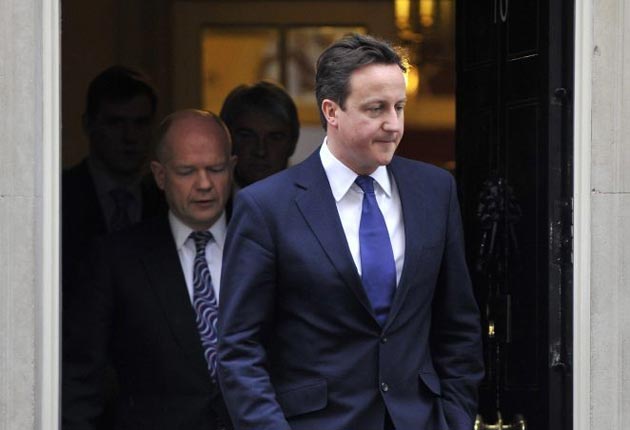Cameron heads to Paris as UN plans next move

Your support helps us to tell the story
From reproductive rights to climate change to Big Tech, The Independent is on the ground when the story is developing. Whether it's investigating the financials of Elon Musk's pro-Trump PAC or producing our latest documentary, 'The A Word', which shines a light on the American women fighting for reproductive rights, we know how important it is to parse out the facts from the messaging.
At such a critical moment in US history, we need reporters on the ground. Your donation allows us to keep sending journalists to speak to both sides of the story.
The Independent is trusted by Americans across the entire political spectrum. And unlike many other quality news outlets, we choose not to lock Americans out of our reporting and analysis with paywalls. We believe quality journalism should be available to everyone, paid for by those who can afford it.
Your support makes all the difference.After days of intense diplomatic activity in the run-up to securing United Nations approval for launching air strikes on Libya, David Cameron will today travel to Paris for emergency talks on tightening the screw on Muammar Gaddafi.
The Prime Minister will meet the leaders of France, Spain and the Arab League, the UN Secretary General, Ban Ki-moon, the European Union's foreign policy chief, Baroness Ashton, and senior figures from Washington.
The summit is designed to underline to Colonel Gaddafi the unity of world opinion ranged against him and its determination to take action if he continues the onslaught against the opposition stronghold of Benghazi.
The leaders will also discuss how to judge whether he is abiding to his promise of a ceasefire and what form military action should take.
The involvement of Arab leaders – and their involvement in any military operation – is regarded as crucial to piling the pressure on the Gaddafi regime.
The PM reacted sceptically yesterday to the Libyan leader's promise of a ceasefire in response to the UN ultimatum as Britain, France and the US pressed ahead with preparations for military action which could start within days.
Faced with his first big test on the world stage, Mr Cameron's diary was largely cleared in recent days to allow him to focus on building international support for intervention to protect Libyan rebels struggling to fend off the counter-attack by Gaddafi's forces. British Typhoon and Tornado jets were already on stand-by to join the operation with France and the US. Mr Cameron said yesterday: "There was a real danger that the world would look on at the horror of all this and yet do nothing. That is why I felt so strongly that it was right to take a clear view, right to help marshal concerted international effort and right to bring forward the action to stop this inhumanity."
Mr Cameron has been at pains to avoid parallels with the Iraq War in his preparations for military intervention in Libya. He has attempted to secure the widest international support possible for the action and repeatedly stressed the legal basis for the move.
Dominic Grieve, the Attorney General, briefed the Cabinet yesterday on the legality of the step and a summary of his conclusions will be supplied to MPs when they debate Libya in the Commons on Monday.
Nick Clegg, the Deputy Prime Minister, a fierce critic of the invasion of Iraq, yesterday underlined the point: "This is not Iraq, we are not going to war, we are not invading Libya. What we are doing is upholding the international rule of law following the vote at the UN."
British diplomatic manoeuvring to win backing for the security council resolution continued until just before the announcement at 10pm on Thursday that 10 members had voted in favour.
In the 24 hours before the vote, Mr Cameron phoned a succession of world leaders, backed up by William Hague, the Foreign Secretary, and senior diplomats. Mr Cameron's spokesman admitted: "It was quite late before we knew it was going to be agreed." The Prime Minister concentrated on Arab leaders, knowing that their approval was essential to build a majority for the resolution. He spoke to the kings of Saudi Arabia and Jordan, the Crown Prince of Abu Dhabi and twice to the Prime Minister of Qatar.
He also called the President of South Africa, which is a security council member, but had to be content with sending a message to the president of another member nation, Nigeria, because he was out of phone reception.
Mr Cameron also made a failed attempt to persuade the German Chancellor Angela Merkel to support the resolution.
Shortly after the vote, Mr Cameron spoke for the first time in more than a week to US President Barack Obama.
Join our commenting forum
Join thought-provoking conversations, follow other Independent readers and see their replies
Comments